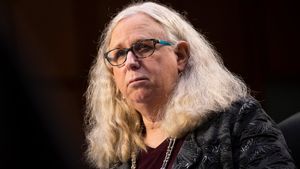According to trans advocate, Cristina Herrera, coming out as trans and transitioning in the 1980s was vastly different from today. Growing up in El Salvador, Herrera recalled the lack of resources and protections for trans people like herself, which made it difficult for her to navigate her identity.
“I always felt different,” Herrera said. “But I wasn’t quite sure who I was and there were individuals that were very close-minded that said very hurtful things. Rejections were very unpleasant.”
It wasn’t until Herrera moved to New York City that she met the first trans person in her life. It was then she finally started to feel there were people out there who understood her. With help from her trans friend’s partner, Herrera began her transition.
“It was a perfect moment for me,” said Herrera. “I realized I wasn’t alone. I saw that there was a path for me. As I grew older, I became more comfortable in my transition, and eventually, I felt complete.”
To offer trans youth that same support she received, Herrera has been involved in LGBTQ+ advocacy for over two decades, working in queer organizations including New York City’s Lesbian, Gay, Bisexual & Transgender Community Center and Lorena Borjas Community Fund. In 2007, Herrera embarked on a new chapter when she founded Translatinx Network, hoping to improve the lives of the immigrant LGBTQ+ communities in the New York metropolitan area. As the CEO of her organization, she told me her leadership is deeply informed by her coming-out journey.
“I’ve been there,” acknowledged Herrera of the struggles her trans communities continue to face today. “It’s why I’ve dedicated my life to creating a safety net for others.”
Through community panels and mutual aid programs, Herrera leads Translatinx Network in encouraging LGBTQ+ youth, especially trans youth, to connect with others who share their experiences.
“We can laugh together, cry together, scream together in happiness, and support one another,” Herrera said.
Beyond community building, Translatinx Network provides a range of programs for LGBTQ+ youth, including healthcare access and workforce development. The nonprofit provides screenings for HIV, STIs, and hepatitis C, as well as access to transition-related care. Herrera also connects community members with potential employers, offering training and resources to help them succeed in the job market.
“They will be able to shape the future of their lives,” said Herrera of the queer youth her organization had supported. “They will contribute to the overall movement of equality, of us being able to access whatever space we want.”
Herrera shared a story about a young trans woman from Mexico who came to her organization at age 18 after enduring abuse from her family due to her identity — Translatinx Network assisted her through her asylum process, and once she secured her working papers, the young woman told Herrera she wanted to give back to her peers.
“That was one of the instrumental examples of our work,” said Herrera, smiling. “It is a testament of resiliency within our community.”
To Herrera, the long-term goal for Translatinx Network is to help her community assimilate, access education, and become leaders. With her fellow 16 full-time employees, most of whom are trans, Herrera hopes to expand the organization’s reach and create more opportunities for LGBTQ+ youth to become their authentic selves and succeed in life.
“Now I know before I go to bed I feel really satisfied,” Herrera reflected on her journey from coming out as trans to becoming the leader in the community in Out’s latest episode of “Coming Out, Me.” “I know that a lot of the pain and struggle that I faced was transformed into strength and wisdom. I feel that the mission of the organization that I lead shows that.”
Join us in making a difference — your donation here can change lives today!
This story is brought to you by our partners at McDonald’s.








































































